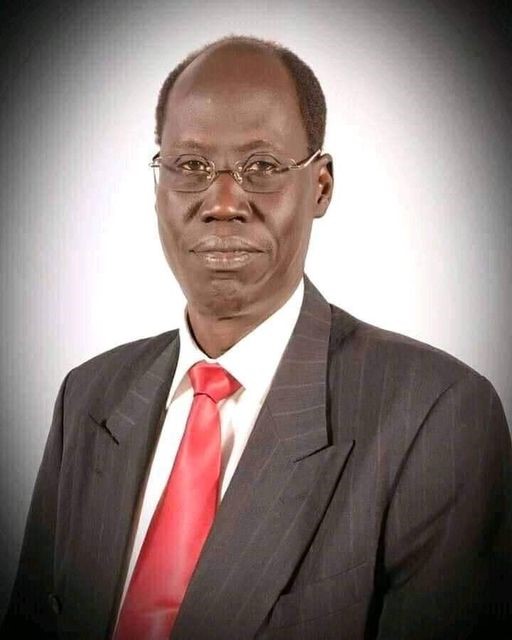
Akol Madut Ngong
A concerned citizen has called on Vice Chancellor (VC) of the University of Juba, Prof. John Akech Apurot to convene a Consolidated Public Debate to address the controversial issue of dredging River Nile and resumption of the digging of Jonglei Canal.
In an open letter addressed to V.C. Akech and seen by No.1 Citizen Daily Newspaper, Dhal Peter Mangok said dredging the River Nile and resumption of Jonglei Canal are now matters of public concern and he is urging Professor Akech and stakeholders to organize symposium.
“The issue of dredging of the Nile, Tributaries and Jonglei Canal has reached the highest level of public concern that needs proper research and intellectual discussions” Dhal asserted. “I am humbly appealing to you as the V.C. of the University of Juba to organize a Consolidated Public Debate in collaboration with the Ministries of Water Resources and Environment as well as other relevant think-tanks to wisely discuss this controversial issue of dredging along the Nile. Tributaries and Jonglei Canal to analytically point out the advantages and disadvantages of digging River Nile and its Tributaries” Dhal appealed to Prof. Akec in his open letter.
Mr. Mangok told No.1 Citizen Daily Newspaper, yesterday that the Nile dredging has become a controversial issue which needs same serious studies to dig out its advantages and disadvantages in the future.
“We have same people who are living along the River Nile who are doing economic activities such as fishing, transportation and farming along the Nile” Peter said. “This issue may cause drought in the future if dredging is done to widen the water ways such that the water can draw, there is a fear in Egypt in the long run the water may not flow as they have been flowing with time this is a case that is why they need to expand the Nile and its tributaries such that water can flow into the river, flowing to Egypt may increase if there is expansion of water ways,” Peter stressed.
He said it need serious studies and serious debate which include intellectuals, environmentalists, water management expert plus other stakeholders, they can come out with accurate opinion, the advantages and disadvantages of dredging, necessarily can affect the economic activities like fishing, field of environment is imminent in the future.
“We can have intellectual debates to know exactly what will be the consequences’ if Nile is dug, if there is a dredging of the Nile, what will be the consequences’ to the Sudd wetlands, and what will be the consequences’ to the people who are surviving on the Nile,” Peter reiterated.
“My message to the public is that, the issue of dredging is a national issue which need our contribution as the people of this nation and also it needs a research to see the consequences’ of dredging” he urged fellow citizens.
The Jonglei Canal was a canal project started, but never completed, to divert water from the vast Sudd wetlands of South Sudan so as to deliver more water downstream to Sudan and Egypt for use in agriculture.
Sir William Garstin proposed the idea of the Canal in 1907; the government of Egypt conducted a study in 1946; and plans took shape between 1954 and 1959 during the period of decolonization which included Sudanese Independence in 1956.
Against the context of Sudan’s post-colonial civil conflict, the Sudan People’s Liberation Army (SPLA), led by the late John Garang halted construction of the Canal in 1984. The dispute over the Jonglei Canal, and access to Nile waters, added a significant environmental dimension to the post-1983, second Sudanese civil war, in which disputes over the religious, linguistic, and cultural elements of Sudanese national identity also played prominent roles.
“It is estimated that the Jonglei canal project would divert 3.5–4.8 cubic kilometres (0.84–1.15 cu mi) of water per year (equal to a mean annual discharge of 110–152 cubic meters per second (3,900–5,400 cu ft/s)), an increase of around five to seven per cent of Egypt’s current supply”.
The complex and potentially catastrophic environmental and social issues involved, including the collapse of fisheries, drying of grazing lands, a drop of groundwater levels and a reduction of rainfall in the region. Limits the practicality of the project.
The Bahr el Ghazal is the main western tributary of the Nile, It is 716 kilometres (445 mi) long, flowing through the Sudd wetlands to Lake No, where it joins the White Nile.
Hydrology, The Bahr al Ghazal’s drainage basin is the largest of any of the Nile’s sub-basins, measuring 520,000 km2 (200,800 mi2) in size, but it contributes a relatively small amount of water, about 2 m³/s (70 ft³/s) annually, due to tremendous volumes of water being lost in the Sudd wetlands, Seasonally, the river’s discharge ranges from nothing to 48 m³/s (1,700 ft³/s)
However, Prof John, the phone was not going through when contacted by No.1 Daily English Newspaper.



